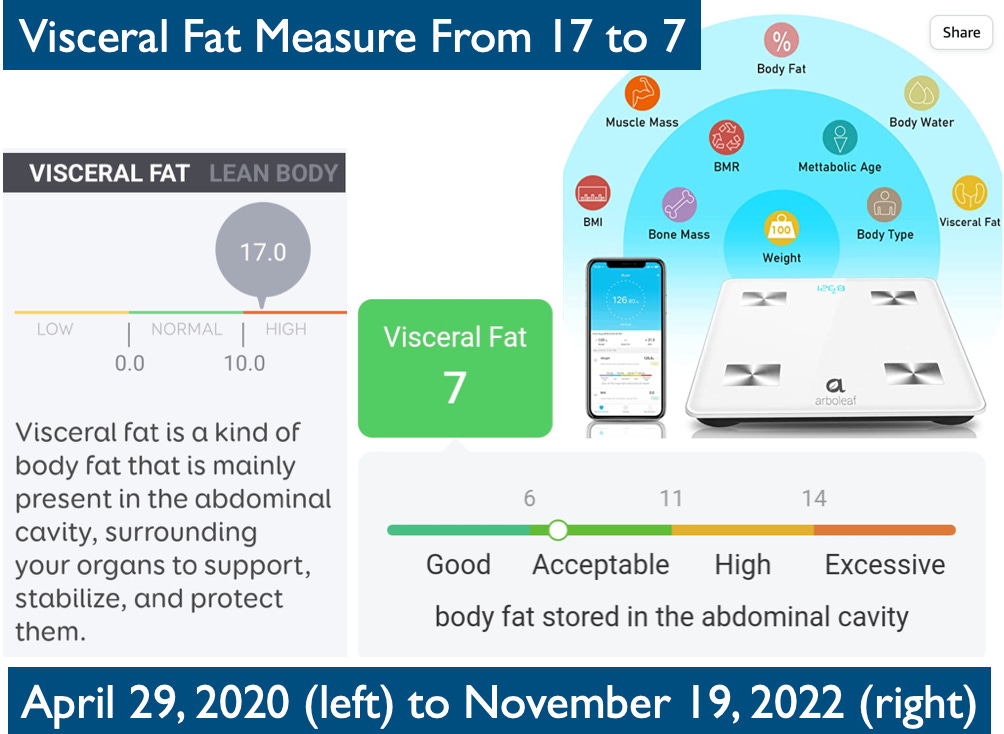Health Care and Metabolic Flexibility
Health care reform? Explain and encourage metabolic health


Notes below from November 2022 Normal Nutrition post discussing my metabolic health journey. This morning, October 1, arboleaf scale reads 195.4 lb, 22.4% body fat. Also recent DEXA provided similar data.
There is not as much of me as there once was: 18% less now than in April, 2020. But measurement of body weight and BMI (Body Mass Index) can be misleading. What matters more are measures of body fat and especially visceral, or belly, fat. Fat is important and healthy in our food, but not healthy in our abdomen.
My $30 smart scale, in April, 2020 showed I was 31% body fat with visceral fat at 17 on a range of good to bad (both 31% and 17 were in the red for danger range). As of in November 2022, body fat was 21.3% and at 7 for visceral fat (7 is Acceptable and almost Good (new image from Arboleaf smart scale, earlier was Eufy). How this happened is told in my exciting new book! (just kidding, notes below and in earlier posts).

From May 2020 to November, 2020, my weight dropped from 231 to 191 and two years later [Nov. 2022] day to day ranged between 190 and 195. Running the numbers: body fat dropped from 71.6 pounds (231 x 31%) to 40.7 (191 x 21.3%). So of 40 pounds lost, 31 was body fat, and mostly visceral fat. My waist size went from 40 inches to 35 (tape measures offer lower-tech way to measure visceral fat!). [And still about the same now, October 2024.]
Gaining Metabolic Flexibility
Somehow from 2020 to 2022 I gained metabolic flexibility, something I didn’t know existed. In college I’d read Siddhartha by Herman Hesse and remember his mantra: “I can think, I can wait, I can fast.” I could think in college (or was learning) and could wait. But what was fasting? Like not eating… for a whole day?
Meals are still enjoyable, but not as often and not in the morning. I don’t eat “many small meals” as most nutritionists recommend, and I usually skip desserts (or have cheese). I have reduced carbohydrates and now skip the bread, rice, pasta and cookies served at social gatherings and conferences. On the flights from Seattle and back, I don’t get hungry so it’s easy to skip the pretzels. No willpower involved. Just habit now, and metabolic flexibility.
My metabolic system is doing what it was designed to do, what human beings have been adapted to do for thousands of years. Body fat is stored energy. It becomes easy to call on the distant metabolic gift, and flip my metabolic switch from fueling mind and body with carbohydrates to burning ketones from body fat. That’s what it’s there for. Only in the modern world do people look to eat or snack every few hours. Most have fallen into a carbohydrate trap of surging and collapsing blood glucose levels (calling out insulin to manage excess blood glucose). Adapted to burning only carbohydrates, not surprisingly, people crave them (as unstable blood glucose levels drop too low).
Most consume more carbohydrates than their bodies can burn, so the excess is stored as body fat. And dealing with high-carbohydrate diets damages metabolic health over time. They become insulin resistant which leads to a host of chronic conditions. That’s what happened to my father who suffered for years with type 2 diabetes. And that was happening to me. Looking back at 2019 blood tests I was pre-diabetic then, and likely earlier.
Lots of Blame to Go Around: Government, Processed Food Industry, “Big Pharma”
Why so much cardiovascular disease, obesity, and type 2 diabetes in the United States, Europe, and now Latin America and India? There is plenty of blame to go around. Metabolic reality remains hidden for most because a) we can’t see inside our blood without blood tests or CGMs (Continuous Glucose Monitors), or ketone meters (like Keto Mojo). Plus people and their doctors think they already know the cause of being overweight. But they have been misinformed, told weight gain is an energy balance problem where calories in = calories out. The popular (and official) story is that most are overweight because they just eat too much and don’t exercise enough.
Experts on both sides of this debate co-authored this August 2024 overview in Nature Metabolism: On the pathogenesis of obesity: causal models and missing pieces of the puzzle.
Many have difficulty metabolizing carbohydrates and it makes sense they should consume fewer carbohydrates (and more healthy fats). Government public health policy since the 1980s Food Pyramid has pushed Americans to reduce saturated fat and consume more carbohydrates.
The history of how nutrition researchers and government agencies came to see saturated fat as public health enemy number one is instructive. Among many histories, here is one by Justin Mares: NIH-Funded “Food Pyramid” Rates Lucky Charms Healthier Than Steak (guest post on Pirate Wires, Nov. 10, 2022).
Another benefit of fasting: autophagy, or taking out the garbage: A Doctor’s Guide to AUTOPHAGY and FASTING: Lose weight, reduce inflammation, and live longer!

